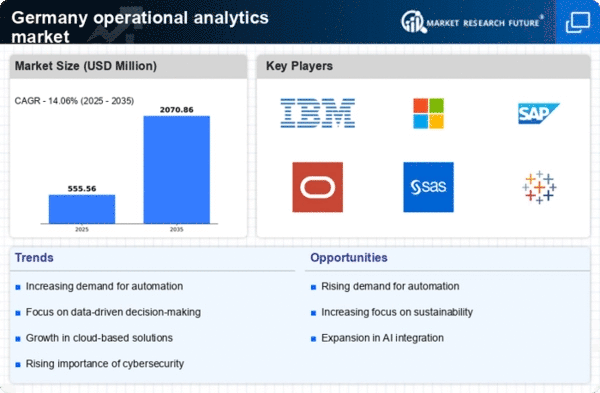Increased Focus on Operational Efficiency
In Germany, there is a growing emphasis on operational efficiency, which is driving the operational analytics market. Companies are under pressure to streamline processes and reduce costs while maintaining high-quality outputs. This focus is reflected in the fact that around 65% of organizations are investing in analytics tools to identify inefficiencies and optimize resource allocation. By utilizing operational analytics, businesses can gain insights into their workflows, leading to improved productivity and reduced operational costs. This trend suggests that the operational analytics market will continue to expand as companies seek to leverage analytics for enhancing their operational capabilities.
Regulatory Compliance and Risk Management
The operational analytics market in Germany is also shaped by the increasing need for regulatory compliance and effective risk management. With stringent regulations governing data usage and privacy, organizations are compelled to adopt analytics solutions that ensure compliance while mitigating risks. As of November 2025, it is reported that nearly 75% of German firms are prioritizing compliance-related analytics to navigate complex regulatory landscapes. This focus on risk management is likely to drive investments in operational analytics tools that provide insights into compliance status and potential risks, thereby fostering growth in the operational analytics market.
Advancements in Cloud Computing Technologies
The operational analytics market is significantly influenced by advancements in cloud computing technologies in Germany. The shift towards cloud-based solutions allows organizations to access and analyze data in real-time, facilitating more agile decision-making processes. As of November 2025, it is estimated that over 60% of German enterprises have adopted cloud solutions for their analytics needs. This transition not only reduces infrastructure costs but also enhances scalability and flexibility, enabling businesses to respond swiftly to market changes. Consequently, the operational analytics market is likely to benefit from this trend, as companies increasingly rely on cloud platforms to drive their analytics initiatives and improve operational performance.
Rising Demand for Data-Driven Decision Making
the operational analytics market in Germany is seeing a surge in demand for data-driven decision-making.. Organizations are increasingly recognizing the value of leveraging data analytics to enhance operational efficiency and drive strategic initiatives. According to recent studies, approximately 70% of German companies are prioritizing data analytics as a core component of their business strategy. This trend is likely to propel the operational analytics market forward, as firms seek to harness insights from vast data sets to optimize performance and improve customer satisfaction. The emphasis on data-driven approaches is expected to foster innovation and competitiveness within various sectors, thereby contributing to the growth of the operational analytics market.
Emergence of Industry-Specific Analytics Solutions
the operational analytics market is seeing the rise of industry-specific analytics solutions.. Industries such as manufacturing, healthcare, and finance are increasingly adopting specialized analytics tools to address their operational challenges. For instance, the manufacturing sector is projected to invest approximately €1 billion in operational analytics solutions by 2026, reflecting a strong commitment to enhancing productivity and efficiency. This trend indicates that the operational analytics market will likely expand as more organizations seek customized solutions that align with their specific operational requirements.
















